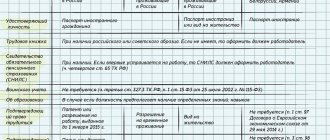Does an employer have the right to fine an employee? This question is of interest to most workers. Over 50% of the total number of employment contracts in Russia contain violations that contradict the norms dictated by labor legislation. Such disappointing data are provided by the results of an audit conducted by the federal service for labor and employment, Rostrud.
An employee’s work activity without a written contract, if there is only an employment order or, worse, by verbal agreement between the employer and the employee, is a very common case. Employees who agree to this are in advance placed in a position of absolute dependence on the company.
If the employment relationship is not formalized, the employer does not transfer contributions to the Pension Fund. Accordingly, employees will not receive an acceptable amount of pension in the future. The Pension Fund, in turn, will identify dependents. The same situation is observed with insurance in case of injury or illness of a professional nature. If insurance is not issued, then payments will not be made.
An employee usually remembers the importance of an employment contract in conflict situations. For example, if management decides to fire an employee, but the employment relationship is not recorded anywhere in writing, then, most likely, it will hardly be possible to prove employment in court.
Are fines legal?
If work activity is confirmed by the existence of a contract, then in most cases a violation of workers’ rights can be observed. Each employer cares only about his own interests and the needs of his enterprise.
In order to reduce tax fees and reduce other types of costs that are provided for by law, an employment contract is not concluded, but instead the employee is offered registration as an individual entrepreneur, and activities are carried out under a contract agreement. If an employee does not agree to be employed under such conditions, he will not be included in the staff, and if he is already working, he is threatened with dismissal, allegedly on his own initiative.
From a formal point of view, there is no violation of the law in this case. Firms of any type can cooperate with employees as individual entrepreneurs. However, the rights of employees who will not be able to receive benefits and payments according to the social package are definitely infringed. At the same time, no one cancels the performance of work duties at the same level as when concluding an employment contract. An employer can enter conditions into a contract that are not legal, create a list listing fines for employees (prohibited by the Labor Code of the Russian Federation), force them to work outside of working hours, etc. In other words, he has a large number of opportunities to violate Labor Code norms, since the employer is paid employee's work activity. And an employee who has a family, credit obligations and rent payments is greatly dependent on the manager.
However, the law is on the side of the workers. If any provisions of the law are violated, the employer may incur administrative or criminal liability. In addition, he may be required to make payments to employees. The employer is unpunished only because the majority of workers do not have information regarding their own rights and articles of the Labor Code. Therefore, only a small part turns to the judicial authorities for help. At the same time, the employer has security personnel, legal specialists, etc. in its arsenal.
Talking doesn't count
Working without a written contract at all, only by order of enrollment or, even worse, by oral agreement between the employee and the administration of the enterprise, is very common. Workers who do this obviously make themselves completely dependent on the company. Without officially formalizing the employment relationship, the employer does not transfer payments to the Pension Fund, which means that he will no longer be able to count on a normal labor pension. It is no coincidence that the Pension Fund will identify “pension dependents.” The same is with social insurance in case of injury or occupational illness. No insurance - no payments.
The employee remembers that a contract is actually needed when a conflict arises. For example, when the administration kicks him out the door, counting on impunity, since labor relations are not recorded on paper. “The employer’s position is: go, employee, look for evidence, present it to the court,” explains Yegor Ivanov, head of the department of legal support and legal support of Rostrud, to RG. — Indeed, the court is given the right to establish labor relations. However, in practice, only a few have such evidence and can, by correctly presenting it to the court, prove their right to formalize labor relations and receive all the guarantees and compensation due to them. Many workers are extremely careless about registering their work: when the need arises to contact the labor inspectorate, they cannot accurately indicate where they work, what the employer’s address is, what his name is, who the accountant is, or the head of the HR department. By the way, there are cases when employment contracts seem to be drawn up, but only in one copy. After signing it, they hide it in the table, and then tell the employee that they are seeing it for the first time.”
Employees are usually dissatisfied when the contract stipulates only the “basic” salary - rate or salary. Usually quite small. The rest of the salary, which consists of incentive and compensating “allowances,” is again negotiated verbally. Sometimes these are increasing coefficients for quality, sometimes bonuses, bonuses for length of service (experienced ones are paid more than newly hired ones), etc. As a result, the employee is promised one amount when he is hired, but the contract states that he is given a much smaller amount. Is it possible to cope with this situation? Another question is about fines for all sorts of offenses, such as being late. Such methods of fighting for discipline are being introduced more and more often. How legal is this?
Competently
Egor Ivanov, head of the department of legal support and legal support of Rostrud:
The terms of remuneration are a mandatory clause of the employment contract. It must include the size of the tariff rate or salary (official salary) of the employee; additional payments; allowances; incentive payments. All these salary elements are determined in accordance with the current employer’s remuneration systems. That is, the bonus system, the system of additional payments and allowances must be prescribed in a collective agreement, agreement or local regulation (for example, an order). That is, what the salary consists of and how it is formed must be transparent and understandable to the employee.
In practice this does not always happen. The fact is that part 3 of Art. 133 of the Labor Code establishes that the monthly salary of an employee who has fully worked during this period the standard working hours and fulfilled labor standards (labor duties) cannot be lower than the minimum wage. In this case, we are not talking about the salary or tariff rate (i.e., a fixed part of the salary), but about the total amount.
Thus, within the meaning of the above norms, the employment contract must indicate only the exact amount of the tariff rate or salary (i.e., a fixed part of the salary). Regarding the remaining elements, the possibility of their payment may be indicated in accordance with a collective agreement, agreement or local regulation.
It is often impossible to specify the full amount of the salary in an employment contract due to the fact that the “above-tariff” part consists of payments, the amount of which depends on individual conditions: length of service in the organization, quality and intensity of work, etc. In any case, workers have the right to participate in the development of documents that regulate this through a trade union organization. If there is no trade union at the enterprise, workers have the right to elect representatives who would negotiate with the administration. In this way, it can be achieved to document clear criteria for the payment of additional payments, allowances, incentive payments and bonuses, i.e. make the wage system more transparent.
As for the system of fines used at some enterprises (reduction of wages for various offenses, for example, for being late, for failure to comply with the dress code, etc.), this is clearly illegal. In accordance with Part 1 of Art. 192 of the Labor Code of the Russian Federation, the employer has the right to apply only three types of disciplinary sanctions: reprimand; rebuke; dismissal.
This list is exhaustive and mandatory for compliance by all employers, with the exception of certain categories of employees (military personnel, civil servants, etc.), for whom federal laws, charters and regulations on discipline may provide for other disciplinary sanctions (Part 2 of Article 192 of the Labor Code). Code of the Russian Federation).
Late salary payments
In case of delay or non-payment of wages, responsibility lies with the employer. If funds have not been partially or fully issued for more than 90 days without justified reasons, the organization may be fined up to 120 thousand rubles for the violation identified. The head of the company is deprived of his position and sometimes his freedom, and the period of deprivation can be up to 12 months.
The actual reason is the bankruptcy process of the company. Partial non-payment of wages is the amount of withheld funds that is less than 50% of the total. A delay in payment of more than 60 days entails a fine for the employer in the amount of up to 500 thousand rubles, as well as a ban on the right to hold certain positions and even arrest for up to 3 years. Accordingly, if the issuance of wages and other types of payments (for example, payment for sick leave) is not made, it is necessary to contact the prosecutor's office. When submitting an application, law enforcement officers will investigate and, if a violation of the law is detected, they will fine the employer or take other measures against him.
The requirement to wear masks and gloves – is it legal?
At the federal level, there is no liability for refusal to use personal protective equipment (mask, gloves). That is, in essence, until appropriate amendments are made to the Code of Administrative Offenses, a fine for the lack of a mask and gloves is an unlawful action on the part of the authorities.
Article 20.6.1 of the Code of Administrative Offenses obliges a citizen to comply with established requirements during the introduction of a high alert regime. This means that the legal consequences of violating the provisions of this article occur only after the official introduction of a high alert regime in the territory where there is a threat of an emergency situation.
The high alert regime gives the right to government bodies of the constituent entities of the Russian Federation to establish rules of behavior that are mandatory for citizens and organizations to follow (subparagraph “u” of paragraph 1 of Article 11 of the Federal Law of December 21, 1994 No. 68-FZ “On the protection of the population and territories from emergency situations of natural and technogenic nature").
In accordance with clause 2.2. GOST 12.4.011-89, the list of personal respiratory protection equipment includes:
- Mask.
- Respirator.
- Self-rescuer.
- Air helmet.
- Pneumatic mask.
- Pneumatic jacket.
Most of the disposable and reusable masks that Russians use do not meet state standards; therefore, they are not personal protective equipment and do not protect against coronavirus.
In addition, constant wearing of masks in some cases can have a detrimental effect on the health of citizens, especially those who suffer from asthma or allergies.
Of course, masks and gloves reduce the risk of infection to some extent. However, today a fine for not wearing gloves and a mask in the subway and other public places is a reason for abuse of official powers by law enforcement officers.
How to file an application with the prosecutor's office?
Completed application forms are accepted by mail, during a personal visit or by filling out an electronic form online. To do this, you need to find the official website belonging to the prosecutor's office of the city where the employee works, and find out all the contact information there for sending an application.
The document will be reviewed without fail, after which the applicant will be informed of the results. The form may contain a personal or collective signature. It is possible to indicate a request for non-disclosure of data regarding applicants. Thus, the employer will not be able to find out the details of the initiator.
When preparing an application to the prosecutor's office, one should remember the responsibility for false data provided, which may become the basis for bringing the applicant to justice before the prosecutor's office and punishment in administrative or criminal form. If you have any difficulties in preparing your application, you can contact a professional legal specialist for help. It is also possible to receive advice on protection from the consequences that may arise as a result of writing an application, on the payment of full wages, the return of all fines withheld earlier, underpaid funds for bonuses for overtime work, and on respecting the interests of the employee in general.
Not only the prosecutor's office can resolve issues of protecting the rights of workers. It is also possible to contact the Labor Inspectorate.
How to report to the Labor Inspectorate?
The Labor Inspectorate has the right to conduct various types of inspections of the employer’s compliance with articles of the Labor Code of the Russian Federation. If violations are identified, Inspectorate employees may demand that they be eliminated and those officials who violated the law be held administratively liable. There is the possibility of checking the fact of an accident at work, recording it and making payments as a result of the employee’s disability and as social security.
To fill out an application, you can apply in person and send a request through the website. You should first visit a lawyer for advice.
Responsibility for imposing fines
Any types of fines are prohibited according to the Labor Code of the Russian Federation. Disciplinary sanctions in the labor sphere against an employee include: a reprimand or reprimand, or, in extreme cases, dismissal. Management has no right to fine employees.
In most cases, part of the salary, which is conventionally called a bonus, can be withheld from the employee as a fine. Some employers simply collect from the established amount of salary specified in the employment contract, without having any basis for this. You can report such employers by indicating in the form the fact of violation of the employee’s rights, and submit the application to the Labor Inspectorate.
What will be the penalties for workers?
It can come from the state or from the employee himself.
Fine from the labor inspectorate
For fining an employee, the entrepreneur risks paying the fine himself. The principled employee will complain to the labor inspectorate. From there they will come with an unscheduled inspection. Inspectors will look at orders for fines, compare wages under contracts with payslips and punish under Art. 5.27 Code of Administrative Offenses of the Russian Federation. An individual entrepreneur faces a fine from 1000 to 5000 rubles, a legal entity - from 30,000 to 50,000 rubles.
Claim from an employee
Deducting a fine from the salary means not paying the employee all the promised money. You can not do it this way. The employee will go to court and recover the cut portion. On top of that, the court will charge interest and add moral damages under Art. 237 Labor Code of the Russian Federation.











